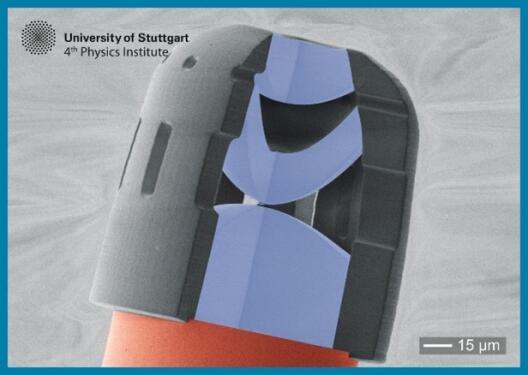

... in Planung ... Termine im SS 2026
Donnerstag, 16 Uhr c.t.
Ab 16 Uhr sind alle Zuhörerenden zum Kolloquiums-Kaffee vor dem HS 2 eingeladen.
Ort: HS 2, IG 1, Wilhelm-Klemm-Str. 10, 48149 Münster
Falls Sie die wöchentlichen Ankündigungen per E-Mail erhalten möchten, schreiben Sie gerne an physkoll@uni-muenster.de.
16.04.2026 Antrittsvorlesungen | A. Mook (FT) und T. Heindel (Dept. QT)
Vortragsankündigung [PDF]
TBA
Einladende/r: Dekanat FB Physiktba23.04.2026 N.N.
Vortragsankündigung [PDF]
TBA
Einladende/r:tba
30.04.2026 CRC 1459 Colloquium
Vortragsankündigung [PDF]
TBA
Einladende: Dr. Kriegel (CRC 1459)tba
07.05.2026 Prof. Harald Giessen (Universität Stuttgart)
3D printed complex microoptics: Fundamentals and first benchmark applications
Einladender: Prof. FallnichWe introduce 3d printed complex microoptics, spanning a range between a few micrometers up to 5 mm. Our lens system consists of aspherical multiplet lens systems which can give high numerical apertures with simultaneously excellent imaginag properties over the entire field of view, even directly on an optical fiber tip. Combining several printed materials with different refractive indices and dispersions and the combination with diffractive elements allows for realization of micro-optical achromats or even apochromats which are aplanatic (no first- and third-order aberrations such as spherical aberration, astigmatism, coma, distortion etc.) and achromatic for 3 wavelengths (red, green, blue). We also demonstrate the direct printing of black resists, which results in aperture stops and blackened hulls.
Atomic layer deposition yields antireflection coatings on all optical elements. Confocal surface profiling and wavefront interferometry demonstrate accuracies far better than lambda/20. In combination with high-resolution nanostructuring, also 3D holograms and metasurfaces can be included.
We utilize these methods to demonstrate the smallest endoscope in the world, being able to pass through a root canal of a tooth, as well as ultracompact sensors with hologon or hypergon lenses or a set of Scheimpflug lenses with nearly 2pi steradian imaging solid angle. Illumination systems as well as holographic projectors and beam shapers directly on optical fiber tips are demonstrated. Coupling single quantum emitters or single photon detectors to single mode fibers is demonstrated. Furthermore, single-fiber optical trapping of polystyrene beads, live cells, or atomic systems becomes a possibility.
Recently, we also demonstrated the use of 3D printed optics inside of a laser cavity, connecting a DBR mirror in a fiber with a solid state laser crystal.
References
T. Gissibl, S. Thiele, A. Herkommer and H. Giessen, Two-photon direct laser writing of ultracompact multi-lens objectives, Nature Photonics 10, 554 (2016).
T. Gissibl, S. Thiele, A. Herkommer and H. Giessen, Sub-micrometre accurate free-form optics by three-dimensional printing on single-mode fibres, Nature Communications 7, 11763 (2016).
T. Gissibl, M. Schmid and H. Giessen, Spatial beam intensity shaping using phase masks on single mode optical fibers fabricated by femtosecond direct laser writing, Optica 3, 448 (2016).
S. Angstenberger, P. Ruchka, M. Hentschel, T. Steinle and H. Giessen, Hybrid fiber-solid-state laser with 3D-printed intracavity lenses, Opt. Lett. 24, 6549 (2023).
21.05.2026 N.N.
Vortragsankündigung [PDF]
TBA
Einladender/:tba
11.06.2026 Prof. Andreas Zumbusch (Universität Konstanz)
Vortragsankündigung [PDF]
Spektroskopie - Glasübergang in kolloidalen Systemen
Einladender: Prof. Fallnichtba
18.06.2026 N.N.
Vortragsankündigung [PDF]
TBA
Einladende/r:tba
25.06.2026 IG1 SOMMERFEST
... Infos folgen
02.07.2026 Prof. Tatyana Galatyuk (TU Darmstadt)
Vortragsankündigung [PDF]
TBA
Einladender: Prof. Weinheimertba
09.07.2026 Dr. Karsten Haustein (Univ. Leipzig) & LEHRPREIS-Vergabe
Vortragsankündigung [PDF]
TBA
Einladende/r: FS Physiktba
16.07.2026 N.N.
Vortragsankündigung [PDF]
TBA
Einladende/r:tba
23.07.2026 N.N.
Vortragsankündigung [PDF]
TBA
Einladende/r:tba

